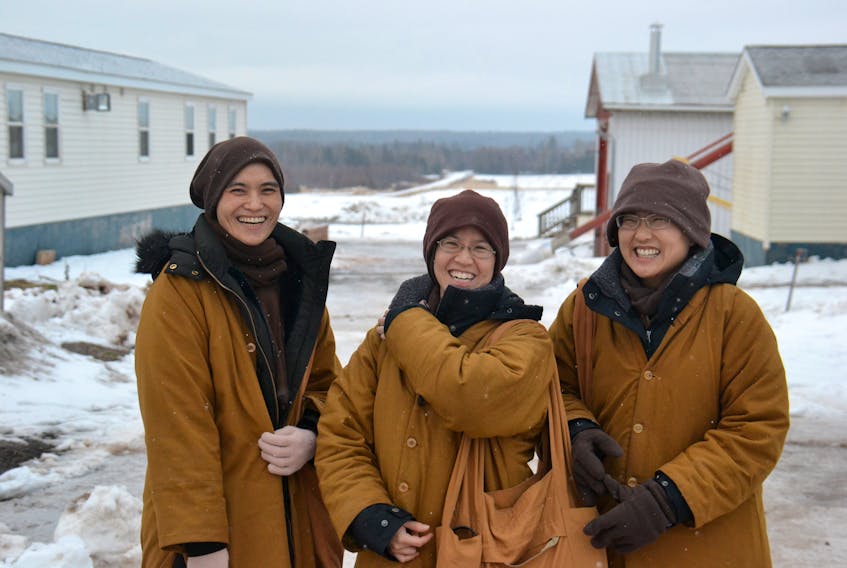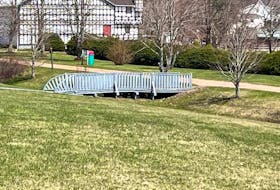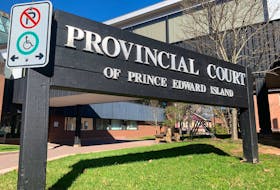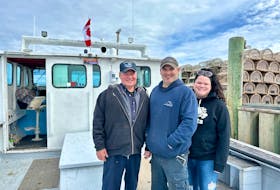Editor's Note:
The Guardian has spent months interviewing members of Buddhist organizations and residents of Kings County about the hundreds of Buddhist nuns and monks who now live in P.E.I. The story that has emerged is one that involves landholdings, immigration, housing, government transparency, religious freedom and geopolitics in Asia. Watch for the second part later this week.
For Joanna Ho, Yvonne Tsai and Sabrina Chiang, three Buddhist nuns who sit on the board of the Great Wisdom Buddhist Institute (GWBI) in Kings County, one word sums up how they felt about saying goodbye to 22 teenaged students last month.
“Sad,” Tsai, Ho and Chiang said in unison, when asked about the departures of the students – all between the age of 14 and 17 – from the monastic academy run by GWBI.
"Many of them cried before they went. They didn't want to leave P.E.I.,” Venerable Yvonne Tsai told The Guardian in an interview.
“They really wanted to be with the elderly nuns. It's like their family."
The students left P.E.I. in January in part because GWBI is facing a shortage of housing for the hundreds of Buddhist nuns who have come to live and take part in the devout study of Buddhism in P.E.I.

Plans to construct additional housing for up to 1,400 nuns, as well as a large-scale religious campus in Brudenell, were brought to a standstill when Three Rivers town council denied a building permit in September.
The decision also brought to the forefront suspicion and distrust some Island residents in Kings County have of the Buddhist organization and its plans for the region.
GWBI’s monastery in Kings County is a rarity. The organization, which traces its origin back to a socially engaged school of Buddhism in mainland China and Taiwan, currently runs a monastery for practising female Buddhists.
"We're the only monastery outside of Tibet and India to offer this to females,” Tsai told The Guardian in an interview last year.
“If they want to learn this type of curriculum, this is the only place they can go. That's why we've been having increased enrolment for the last few years."
Bliss and Wisdom
Individuals who come to P.E.I. to take part in the Great Wisdom Buddhist Institute’s rigorous program of study are often followers of Bliss and Wisdom, an 80,000-member Buddhist organization that is effectively the parent organization of GWBI. The spiritual leader of Bliss and Wisdom, a woman known as Master Zhen-Ru, lives in P.E.I.
The popularity of GWBI’s curriculum has meant the community has grown beyond the capacity the group currently has to house them.
There are about 470 practising nuns in P.E.I., who have arrived from mainland China, Taiwan, the United States, Singapore and other countries.
Most are scattered between a converted farmhouse in Uigg, a former 'lobster shanty' motel and restaurant in Montague, a number of scattered homes and a new dormitory hall in Brudenell.
“We want to live together because we're a family,” Tsai said.
About 150 people protested the planned Brudenell monastery construction outside the Three Rivers meeting in September, surprising many town councillors.
Residents accused GWBI of contravening the Lands Protection Act (LPA), a unique piece of legislation in P.E.I. that sets out limits on landholdings of corporations and non-residents.
Others suggested GWBI or its parishioners were buying up houses in the area and leaving them empty, driving up real estate costs in the process.

Many Islanders have been open and welcoming to the Buddhist nuns during the past decade.
But September’s council meeting caused concern, for both parents and students.
Some wondered whether Islanders were rejecting the monastic community as a whole.
"The parents read the news. And then the parents, due to COVID they can't come here,” Tsai said.
“So they shared the information with the kids. So the kids got kind of worried.”
Tsai said the decision for the students to return to their home country was made by teachers as well as the board of GWBI.
She believes it is for the best, but added the vast majority of nuns and remaining young students very much want to remain in P.E.I.
The denial of the Brudenell permit has put GWBI at a crossroads.
Conditions at the farmhouse in Uigg and at the lobster shanty are cramped and the separated communities are far from ideal. Chiang said she shares a room with eight people.
These facilities have also effectively been on lockdown since the start of the COVID-19 pandemic, with very limited visitors.
Tsai says P.E.I.’s deputy fire marshal has recommended nuns living at the lobster shanty move out by the end of 2021.
The location is simply not up to the new fire codes.
“We need to find housing for 70 people," Tsai said.
"Right now, we don't want to do anything that will scare people. But we really don't know what to do."
The planned campus in Brudenell would have been able to provide the needed housing spaces as well as teaching space, lecture halls, a worship space and green space.
Three Rivers Mayor Ed MacAulay said he was surprised by the opposition at the September council meeting.
Many of the concerns about land holdings of GWBI and the Great Enlightenment Buddhist Institute Society (GEBIS), the sister organization of GWBI composed largely of male monks, have been around for years.
“In my opinion, it has a lot to do with the lack of facts and the lack of information. And I think there's a lot in the rumour mill,” MacAulay told The Guardian in November.
“I think that GEBIS and GWBI have been kind of a victim of that, to some degree."
Tsai said the organization has embarked on a sort of listening tour of community leaders and members in Kings County.
Islanders have told her they want more transparency about GWBI’s activities.
"Our first priority is to communicate with the local community to build trust rather than pushing that construction plan,” Tsai said.
A three-year-old investigation conducted by the Island Regulatory and Appeals Commission (IRAC) could provide clarity on some of the concerns related to GWBI’s landholdings.
Between 2015 and 2018, The Guardian has confirmed, IRAC conducted an investigation into the landholdings of five Buddhist organizations.
IRAC Investigation Letter by The Guardian
These were GEBIS, GWBI, the Moonlight International Foundation, which runs an animal sanctuary, Grain Essence Garden Inc., which owns the Leezen grocery store in Charlottetown, and Splendid Essence Restaurant.
It is unclear whether IRAC found the organizations to be linked at all. IRAC has not communicated its findings to GWBI.
Tsai said she did not wish to criticize IRAC. To do so would be against her Buddhist precepts, she said. She expressed a willingness to work with IRAC.
"I personally would like to know what they think about us," she said.
"I would like them to tell me what they feel we should do."
IRAC has declined to release details on the report’s findings.
Even P.E.I.’s minister of agriculture says he has not seen the report.
"I'm just aware that it happened or that it could have possibly happened,” Bloyce Thompson told The Guardian in October.
After appearing before a standing committee meeting Feb. 18, IRAC CEO Scott MacKenzie said its procedures for land investigations involve providing a copy of the investigative report to respondents.
He also said IRAC investigations remain confidential in cases where an infraction of the LPA is not found.
No orders involving contraventions of the LPA have been made public by the commission since 2014.
"The investigations that we've done did not bear out that there was a violation. And in those circumstances, the investigations are confidential," MacKenzie said.
But when asked why GWBI appeared to have not been provided with a copy of the 2018 investigation report, MacKenzie said he could not comment on specific cases.
IRAC’s refusal to release details of this investigation has echoes of a 2020 IRAC investigative report into the Brendel sale.
This sale of 2,200 acres of land, which occurred without cabinet approval, prompted another IRAC investigation.
That investigation’s findings have also not yet been released publicly, although Thompson has said one of the buyers contravened the Lands Protection Act.
Critics often claim GWBI and GEBIS control or own more land than they are permitted under the LPA.
The act, designed to protect against consolidation of limited farmland, limits corporate landowners to ownership of 3,000 acres.
One of those critics is David Weale, an author and editor of RED Magazine.
"The main issue for me was, and remains, the purchase of land — here, there and everywhere. Thousands and thousands of acres,” Weale told The Guardian.
"In Prince Edward Island, I get defensive when strangers come in and start up buying up a lot of land without answering any questions."
But The Guardian has found the combined total acreage owned by both GEBIS and GWBI are verifiably well below this limit.
A public search of land purchases on the IRAC website shows GWBI currently owns 672 acres while GEBIS owns 584 acres.
Weale still believes the two organizations have disguised their holdings by arranging land purchases through either lay followers or through landholding corporations established by lay followers.
"These people are extremely loyal to this group,” Weale said.
“They're buying it, there's no doubt in my mind, because of the group. So it's a circumvention of the spirit of the legislation."
In the past, GWBI has admitted to assisting in the negotiation and purchase of land and houses for lay followers who had newly arrived in P.E.I.
Tsai said this was done because newly arrived parishioners often did not understand English, let alone understand how to negotiate home purchases.
“One of the reasons (is) they want to be close to their children. Second, they believe the positive energy from the monastery would affect them a lot," Tsai said.
Tsai said GWBI no longer offers this help to newly arrived immigrants or seasonal residents from Taiwan. There is too much suspicion.
“Imagine that you were moving to Asia with some of your Islander friends. You would help each other out because you don't know the language,” Tsai told The Guardian.
“Now we're forced not to help out because we will look bad."
“We're really scared to help our parents," Ho added.
A 2016 purchase of a house and 20 acres of land has raised questions about these purchasing practices.
This transaction came up during the October meeting of the standing committee on natural resources and environmental sustainability.
Tsai, Chiang and Ho spoke before MLAs from all three major parties.
During the meeting, Progressive Conservative MLA Cory Deagle confronted Tsai, Chiang and Ho with a series of internal emails he had obtained between staff and board members of GWBI.
Deagle did not share the emails with Tsai, Ho or Chiang during the committee meeting. He said he wanted to protect the source who sent them to him.
The Guardian has reviewed these emails.

One, dated Aug. 16, 2016, referred to the purchase of a home at 32 Fox Run Acres in Brudenell.
The email was sent from a former board member of GWBI, named in the emails as Janet. It referred to the IRAC investigation that was ongoing at the time.
“See if this will work. Let’s pretend that the lay people are buying first for better negotiation and then transfer to GWBI later before closing,” Janet wrote in the email.
Another email sent from Janet, dated Aug. 5, 2016, says there would be “five buyers to hold title to avoid IRAC application” in relation to the Fox Run property.
Under the Lands Protection Act, a non-resident can purchase up to five acres without seeking approval from cabinet.
Using five individuals would allow the purchase of a property of up to 25 acres without approval from cabinet.
Doug Campbell, P.E.I. district director for the National Farmers Union, says this was a clear circumvention of the Lands Protection Act.
“They've admitted to being in violation of the act. So why isn't somebody doing something about that?" Campbell said.
"What was the purpose of the Lands Protection Act? It was to protect against foreign interests and to make sure the farmers could farm, and processors could process."
But speaking before the committee, Tsai said Janet, who is no longer a board member with GWBI, had been advised about the five-person loophole by a local realtor.
“She later realized that it’s not the way it could be accepted,” Tsai told the committee.
Tsai later provided The Guardian with an email chain from a local realtor representing the seller of 32 Fox Run Acres.
“I understand that your client may have several individuals who are P.E.I. residents who would not require IRAC approval to purchase this property personally and then they could transfer these properties to GWBI,” said the email from the realtor, dated March 30, 2016.
“We think it is improper to do so for someone to purchase the land without applying to IRAC with the intention to directly transfer the land back to GWBI,” Tsai wrote in an email reply dated April 4, several months before the messages written by Janet.
In the end, the Fox Run Acres property was purchased in October 2016 by five individuals, all residents of New Taipei City in Taiwan.
But the property has not been transferred to GWBI and is currently still owned by these individuals.
Tsai told The Guardian the property has been used by GWBI only twice since 2016 – once for use for self-quarantining nuns during the pandemic and once for a retreat.
It is far from clear whether this represented any contravention of the LPA.
The Fox Run Acres property is one of several that have aroused suspicion. Some of the internal emails from October’s standing committee listed seven houses in the Brudenell area owned by either nuns or lay followers.

GWBI carries out regular maintenance and snow-clearing of these seven homes. Many are vacant during the winter months but GWBI members have been observed using them for activities, such as storage of goods or food.
Jason Ellsworth, a lecturer in the department of sociology and social anthropology department at Dalhousie University in Halifax, has been studying GWBI and GEBIS on P.E.I. for several years.
Several people — “come-from-aways” and locals — have told him they believe a discriminatory double-standard is being applied when it comes to the landholdings of the Kings County Buddhists.
“Why are we looking at one specific religious community — the Buddhists — but not looking at Catholic communities or Protestant communities? They have vast amounts of land if you put them together,” Ellsworth said.
The experience of GWBI could be looked at as that of an immigrant community.
Many lay followers have arrived with significant resources and access to capital that many Islanders do not have.
Ellsworth said Canada’s immigration system often seeks out migrants with access to financial wealth or capital.
"One of the big questions for people, all the time, is do you have money so you can sustain yourself so you're not going to be a drain on our system?” Ellsworth said, referring to federal requirements set out for immigrants in economic streams.
“And here comes a group that does have money. But it's almost as if they have too much, to people. And now they can do more than people want them to be able to do.”
Chiang told The Guardian that lay followers or families of nuns are not always in lockstep with decisions of the GWBI board. Many have independent careers as realtors or entrepreneurs.
Islanders often view some of the business activity of lay followers to be linked with the activity of GWBI, even if the two are not at all connected, she said. Co-ordinating members of Eastern P.E.I.'s Taiwanese or Mainland Chinese residents is not something the group is able to do.
"It's because we don't really know what we're doing (and) everyone's just doing their own thing that it's turned out like this," Chiang said.
Stu Neatby is The Guardian's political reporter.









